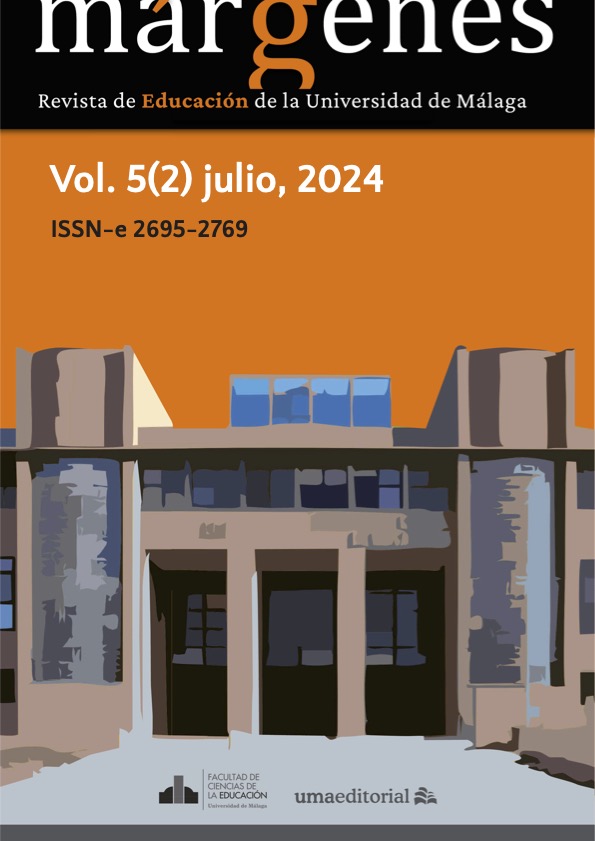Hegemonic logics of evaluation: tensions and contradictions in educational assessment
DOI:
https://doi.org/10.24310/mar.5.2.2024.19246Keywords:
classroom assessment, standardized testing, assessment and reproduction inequality, teaching and evaluation, democratic assessmentAbstract
This article, written as an essay, seeks to contribute to the reflection on the discourses and practices of evaluation that support the hegemonic meritocratic thinking on education, reinforcing the conservative function of social and cultural reproduction (Bourdieu and Passeron, 1967). A reflection on evaluation in teaching is proposed, in a scenario in which the school seems to be stuck in fruitless debates without advancing in the construction of a critical thinking that enables or promotes an analytical view that problematizes the voracious and uncritical consumption of information that comes mainly from social networks and mass media. It also analyses the resistance, tensions and contradictions that coexist with the ideas and actions proposed from a pedagogical approach to evaluation as an evaluative and reflective, democratic practice, whose meaning and functionality is inseparable from teaching. As a contribution to deepen the subject, it is described and analysed an experience of mass evaluation in the Province of Buenos Aires, which is positioned as a teaching policy and challenges the hegemonic logic of standardised tests.
Downloads
Metrics
Publication Facts
Reviewer profiles N/A
Author statements
Indexed in
-
—
- Academic society
- N/A
- Publisher
- Universidad de Málaga
References
Anijovich, R. y Capelletti, G. (2017). La evaluación como oportunidad. Paidós.
Connell R.W. (2006). Escuelas y justicia social. (3ª ed.). Morata.
Bourdieu, P. y Passeron, J.C. (1967). La reproducción. Laia.
Braslavsky, C. (1985). La Discriminación Educativa. Miño y Dávila.
Feldman, D. (2023). Enseñanza y responsabilidad. Anales de la educación común, 4(1-2). https://n9.cl/jcq4g
Fenstermacher, G. (1989). Tres aspectos de la filosofía de la investigación sobre la enseñanza. En M. Wittrock, La investigación en la enseñanza (149-179) Paidós.
Jackson, Ph. W. (1968). La vida en las aulas. Morata.
Martín, K. (1978, 29 de mayo) Paulo Freire: "La educación es siempre un quehacer político". El País. https://n9.cl/053t3
Perrenoud, P. (2008). La evaluación de los alumnos. Colihue.
Sverdlick. I. (2012). ¿Qué hay de nuevo en evaluación educativa? Noveduc.
Sverdlick. I. (2019 a). ¿Qué puede haber de nuevo en la evaluación educativa? El debate continúa. Comunidad OPPPED/Ciencias de la Educación /Facultad de Filosofía y letras /UBA. https://n9.cl/u69fu
Sverdlick. I. (2019 b) Inclusión educativa y derecho a la educación: La disputa de los sentidos. Archivos Analíticos de Políticas Educativas, 27(26), 1-24. http://dx.doi.org/10.14507/epaa.27.3197
Sverdlick. I. (2020). La evaluación en cuarentena. Reflexiones en un presente desconocido sobre un futuro incierto. Sociales y Virtuales, 7(7). https://n9.cl/jsnkcn
Sverdlick. I. (2021). La evaluación interpelada en tiempos de pandemia 2020-2021. Revista Anales de la Educación Común, 2(1-2), 139–148.
Sverdlick, I. y Austral, R. (2023). Democracia, Educación y derecho al futuro en la provincia de Buenos Aires. Revista Anales de la Educación Común, 4(1-2), 11-21, https://n9.cl/2gacw
Sverdlick, I. Austral, R. y Moyano, I. (2023) Evaluaciones estandarizadas. Críticas y contrapuntos a las lógicas hegemónicas a partir de una experiencia reciente en la provincia de Buenos Aires. Jornal de Políticas Educacionais, 17, 1-25. http:// 10.5380/jpe.v17i2.92257
Downloads
Published
How to Cite
Issue
Section
License
Copyright (c) 2024 Márgenes Revista de Educación de la Universidad de Málaga

This work is licensed under a Creative Commons Attribution-NoDerivatives 4.0 International License.
The editorial team of Márgenes supports an open Access policy of scientific knowledge. apostamos claramente por una política de acceso abierto del conocimiento científico (see Berlin Declaration).
Authors with work published in this journal accept the following conditions:
- This journal provides immediate free access to its content under the principle of making research freely available to the public. All contents published in Márgenes are subject to the Creative Commons Reconocimiento-SinObraDerivada 4.0 Internacional
It is the responsibility of the authors to obtain the necessary permissions of the images that are subject to copyright.
Authors whose contributions are accepted for publication in this journal will retain the non-exclusive right to use their contributions for academic, research and educational purposes, including self-archiving or deposit in open-access repositories of any kind.
The electronic edition of this magazine is edited by the Editorial of the University of Malaga (UmaEditorial), being necessary to cite the origin in any partial or total reproduction.
- Authors can enter into other additional independent contractual agreements for the non-exclusive distribution of the version of the article published in this journal (e.g. including it in an institutional repository or publishing it in a book) on the condition that they clearly indicate that the work was originally published in this journal.
- Authors are allowed and recommended to publish their work on the Internet (for example on institutional and personal websites), before and after the publication, as this could lead to constructive exchanges and a more extensive and quick circulation of published works (see The Effect of Open Access).















